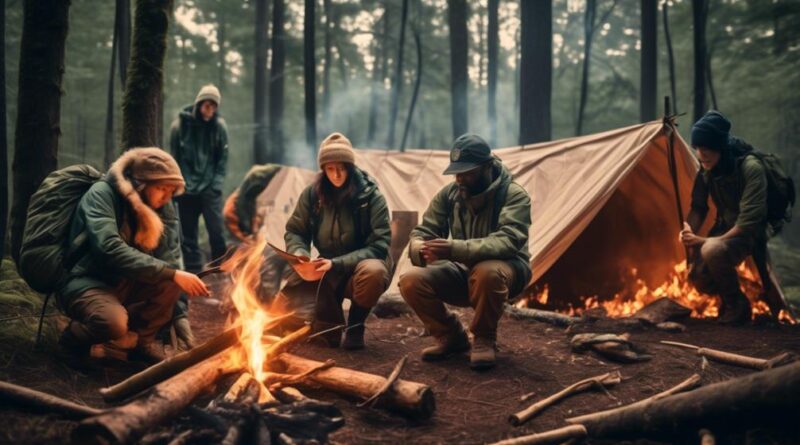Eight Essential Tips for Survival Training Holidays
When it comes to survival training holidays, navigating the wilderness is like embarking on a complex puzzle, where each piece holds the key to your wellbeing.
Whether you're a seasoned adventurer or a novice explorer, mastering the art of survival in the great outdoors requires a set of essential skills and knowledge.
From choosing the right location to understanding local wildlife, there are crucial tips that can make or break your experience.
So, as you prepare for your next wilderness excursion, it's vital to equip yourself with the knowledge and tools needed to thrive in the face of nature's challenges.
Choosing the Right Location
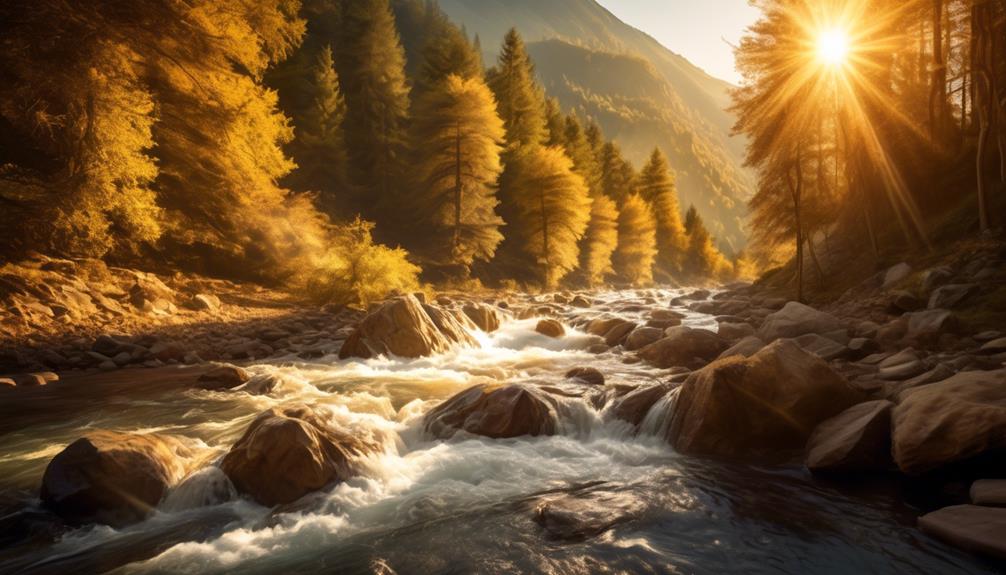
Choosing the right location for your survival training holiday is crucial for a successful and enriching experience. When it comes to location selection, environmental factors play a pivotal role. Look for a place that offers diverse terrains, such as forests, mountains, or deserts, to challenge and expand your survival skills. Consider the climate and seasonal changes, as they'll impact your training and the techniques you'll need to learn.
Additionally, immersing yourself in a new culture can greatly enhance your experience. Seek out locations that offer opportunities for cultural immersion and exposure to local traditions. Engaging with the customs and practices of the area can provide valuable insights into traditional survival methods and foster a deeper appreciation for the environment.
When scouting for the perfect location, it's essential to research the area thoroughly. Look for regions known for their natural beauty and rich cultural heritage. Consider places that offer a balance of challenging landscapes and opportunities to interact with local communities. Whether it's learning how to forage for food in a specific ecosystem or understanding the traditional ways of building shelters, embracing local traditions can provide a unique perspective on survival.
Packing the Essentials
When preparing for your survival training holiday, ensuring you pack the essentials is vital for tackling the diverse terrains and challenges of your chosen location. Here are some essential gear and packing tips to consider for your adventure:
- Multi-tool: A versatile and compact tool that can assist you with various tasks such as cutting, repairing gear, and even starting a fire.
- Water purification system: Access to clean water is crucial for survival. Pack a portable water filter or purification tablets to ensure a safe drinking supply.
- Emergency shelter: Carry a lightweight and durable tarp or tent that can provide protection from the elements in case of unforeseen circumstances.
- Survival knife: A high-quality, durable knife is an essential tool for building shelters, preparing food, and other survival techniques.
- Wilderness first aid kit: Accidents can happen, and having a well-stocked first aid kit tailored for wilderness environments is essential for addressing injuries and emergencies.
When packing, consider the weight and functionality of each item to ensure they serve a practical purpose. Additionally, familiarize yourself with the proper use of the gear and essential survival techniques before embarking on your adventure.
Proper packing and preparation won't only enhance your experience but also contribute to your safety during your survival training holiday.
Learning Basic Survival Skills
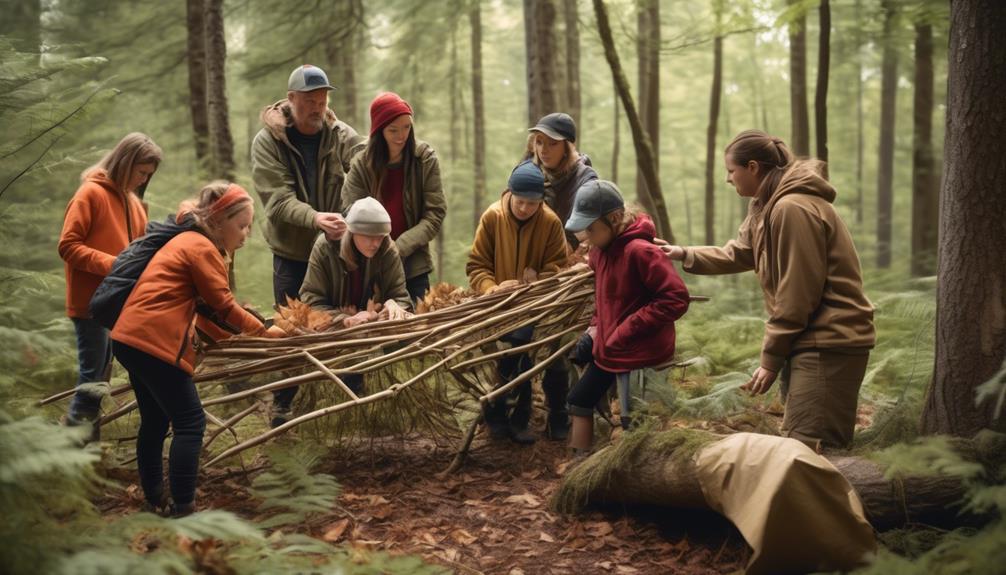
To develop your ability to survive in the wilderness, mastering basic survival skills is essential for your training holiday. Learning basic survival techniques will equip you with the necessary outdoor survival skills to navigate and endure in the wild.
Start by familiarizing yourself with essential knots for shelter building and securing food. Knowing how to tie a secure taut-line hitch or a strong figure-eight knot can make all the difference in constructing a reliable shelter or setting up a trap for catching small game.
Next, focus on mastering fire-building skills. Understanding various fire-starting methods such as using a fire starter, flint and steel, or creating friction with a bow drill can be crucial for keeping warm, cooking food, and signaling for help. Additionally, learning how to identify edible plants and sources of safe drinking water is fundamental. Basic knowledge of foraging for food and purifying water will sustain you in the wild.
Furthermore, honing your navigation skills using a map and compass will prevent you from getting lost. Understanding how to read terrain features and orient yourself using natural landmarks are invaluable skills for wilderness survival.
Lastly, familiarize yourself with basic first aid techniques, such as treating wounds, burns, and insect bites. These skills will prepare you for unexpected emergencies during your training holiday.
Mastering these basic survival skills won't only enhance your experience but also provide you with the confidence to tackle the challenges of the great outdoors.
Understanding Local Wildlife
Observing the behavior and habitats of local wildlife will provide you with valuable insights for your survival training holiday. Understanding the wildlife in the area where you'll be training is crucial for staying safe and making the most of your experience. Here are some essential tips for understanding local wildlife:
- Study the Local Habitats: Take the time to understand the different habitats in the area, whether it's forests, grasslands, or wetlands. Each habitat will host different types of wildlife, and understanding these ecosystems will help you anticipate encounters.
- Identify Dangerous Species: Learn about the potentially dangerous wildlife in the area, such as venomous snakes or large predators. Knowing how to recognize and avoid these species is essential for your safety.
- Learn Wildlife Behavior: Educate yourself about the behavior patterns of local wildlife. Understanding how animals move, hunt, and defend themselves will help you avoid unexpected wildlife encounters.
- Respect Wildlife Boundaries: Keep a safe distance from wildlife and avoid approaching or disturbing animals in their natural habitats. Respect their space to minimize the risk of confrontations.
- Know Where to Find Water Sources: Understanding the watering holes or streams that local wildlife frequent can provide you with valuable information about animal movements and potential food sources.
Building Shelter and Fire
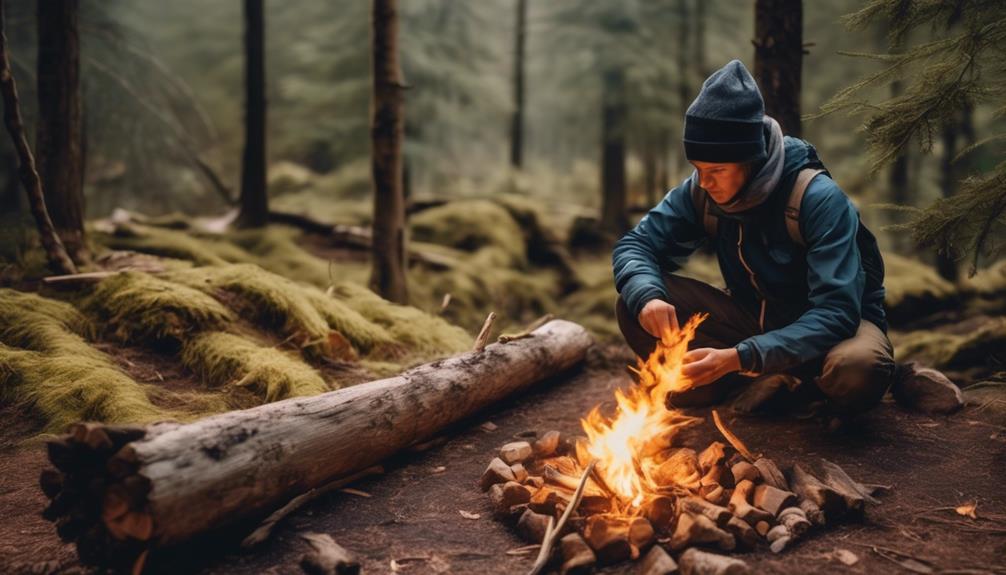
As you embark on your survival training holiday, mastering the skills of building shelter and fire is essential for ensuring your comfort and safety in the wilderness. When it comes to shelter construction, it's important to assess your surroundings for materials such as branches, leaves, and natural formations that can provide sturdy protection from the elements. Learn how to build different types of shelters, from simple lean-tos to more complex debris huts, to suit various environments and weather conditions.
For fire building techniques, understanding how to start a fire without matches or a lighter is crucial. Practice using methods like friction-based fire starting, such as the bow drill or hand drill, and learn to identify and gather suitable tinder, kindling, and fuel. Additionally, wilderness cooking over an open fire is a valuable skill. Experiment with cooking techniques like using a stick or spit to prepare meals, and familiarize yourself with safe food foraging and preparation.
In case of emergencies, being able to signal for help is vital. Carry a signaling device such as a whistle or mirror, and know how to create visible signals like smoke or ground markers. Furthermore, understanding emergency communication procedures and devices can make a significant difference. Learn how to use tools like signal flares or two-way radios to communicate distress and coordinate rescue efforts.
Navigation and Orientation
When navigating in the wilderness, rely on natural landmarks and your compass to maintain your orientation and reach your destination safely. Map reading and compass use are essential skills for wilderness navigation. By understanding wilderness navigation techniques and honing your orienteering skills, you can confidently explore remote areas.
Here are some crucial tips for honing your navigation and orientation skills:
- Map Reading: Study and understand topographic maps to identify key features and plan your route effectively.
- Compass Use: Learn how to use a compass to set and follow a bearing, ensuring you stay on the right track even in unfamiliar terrain.
- Identifying Natural Landmarks: Familiarize yourself with natural landmarks such as mountains, rivers, and distinct trees to help maintain your bearings.
- Celestial Navigation: Basic knowledge of using the sun, moon, and stars for navigation can be invaluable, especially when other methods fail.
- GPS Technology: While traditional navigation skills are crucial, understanding how to use GPS devices can provide an extra layer of safety and precision.
Finding Food and Water
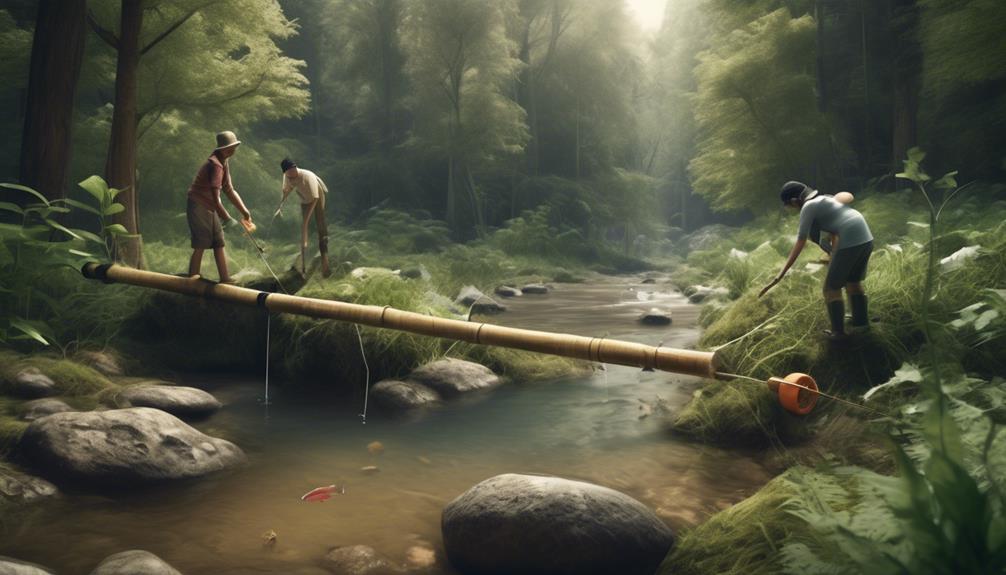
To ensure your survival in the wilderness, knowing how to find food and water is essential for sustaining yourself during outdoor adventures. Finding clean water is a top priority. Look for natural water sources such as rivers, streams, and lakes. Remember to purify the water before drinking by boiling it or using purification tablets to remove harmful bacteria and parasites. If clean water is scarce, you can collect rainwater using a tarp or large leaves, and then filter and boil it to make it safe for consumption.
Foraging for food is another crucial skill. Learn to identify edible plants and fruits in the area you'll be exploring. Look for wild berries, nuts, and edible greens. Be cautious when foraging and avoid consuming anything unless you're absolutely certain it's safe to eat. You can also try your hand at fishing or setting up traps to catch small game. Carry a small fishing kit and learn basic trapping techniques to increase your chances of procuring food.
Remember to conserve your energy and stay hydrated as you search for sustenance. Keep a lookout for animal tracks and signs of wildlife, as they can lead you to potential sources of food and water. With the right knowledge and preparation, you can improve your chances of finding the sustenance needed to survive in the wild.
Safety and Emergency Protocols
Implementing safety and emergency protocols is crucial for ensuring your well-being during outdoor excursions. When venturing into the wilderness, it's essential to be prepared for any unforeseen circumstances. Here are some vital safety and emergency protocols to keep in mind:
- Emergency First Aid Kit: Always carry a well-stocked first aid kit, including bandages, antiseptic wipes, pain relievers, and any personal medications you may need. Be sure to familiarize yourself with the contents and their uses before setting out.
- Emergency Communication Devices: Bring a fully charged mobile phone and a portable charger. Additionally, consider investing in a satellite phone or emergency locator beacon for remote areas where cell service may be unavailable.
- Inform Others of Your Plans: Before heading out, inform a trusted person of your itinerary, including your intended route and expected return time. This ensures that someone is aware of your whereabouts in case of an emergency.
- Navigation Tools: Carry a map, compass, or GPS device, and know how to use them. These tools are invaluable for staying on course and finding your way back if you get lost.
- Emergency Shelter: Pack a lightweight, compact emergency shelter such as a space blanket or a bivvy bag to protect yourself from the elements in case you're unexpectedly stranded.
Frequently Asked Questions
Are There Any Age Restrictions for Participating in Survival Training Holidays?
Yes, there are age restrictions for survival training holidays. The training requirements vary, but some programs may have a minimum age requirement of 18. It's best to check with the specific program for their age restrictions.
What Kind of Physical Fitness Level Is Required for Survival Training Holidays?
To thrive in survival training holidays, you need a good level of physical endurance and fitness. The training intensity demands strength and stamina to build survival skills. Prepare beforehand to handle the physical demands effectively.
Can I Bring My Own Survival Gear or Do I Have to Rent It?
You can bring your own survival gear, but rental options are available. Make sure to check the packing checklist for personal equipment. There may be age limits and training requirements, and consider any dietary needs for meal options.
Are There Any Specific Dietary Restrictions or Accommodations for Meals During the Training?
Yes, there are specific dietary restrictions and accommodations for meals during the training. You can inform the organizers about any dietary restrictions or allergies beforehand, and they will make sure to accommodate your needs.
What Kind of Medical Training or Background Do the Instructors Have?
The instructors have extensive medical training and backgrounds, with certifications and years of experience. They are well-equipped to handle any medical emergencies that may arise during the training, ensuring your safety throughout the program.
Conclusion
So, whether you're heading into the wilderness for a survival training holiday or just want to be prepared for any situation, these tips will help you make the most of your experience.
Remember to stay safe, be prepared, and enjoy the adventure!
Happy surviving!
